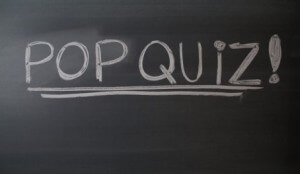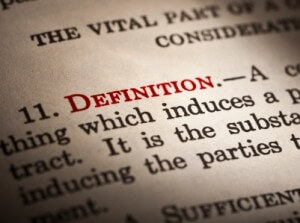Talking Like a Fancy-Pants: Florid vs. Bombastic
English has many words to describe all-too-fancy writing. A good one is florid, which means “flowery” — that is, using an excess of adjectives, figurative language, and, often, unnecessary descriptions of the landscape.
Some people think Hawthorne was a rather florid writer:
Like all that pertains to crime, it seemed never to have known a youthful era. Before this ugly edifice, and between it and the wheel-track of the street, was a grass-plot, much overgrown with burdock, pigweed, apple-peru, and such unsightly vegetation, which evidently found something congenial in the soil that had so early borne the black flower of civilized society, a prison.
Bombastic writing has the added element of being pretentious. From Christopher Marlowe:
Our quivering lances, shaking in the air,
And bullets, like Jove’s dreadful thunderbolts,
Enroll’d in flames and fiery smouldering mists,
Shall threat the gods more than Cyclopean wars;
And with our sunbright armour, as we march,
We’ll chase the stars from heaven, and dim their eyes
That stand and muse at our admired arms.
Fun fact: bombast was once padding material used to puff up clothes!
Florid and bombastic writing is sometimes referred to as purple prose (since purple was once a sign of royalty, and sometimes lower-class people would display little bits of purple on their clothes to try to seem fancy). The Wikipedia page quotes several examples from Edward Bulwer-Lytton (the “It was a dark and stormy night” guy):
Other instances of purple prose quoted from the novel include “As soon as the Promethean spark had been fully communicated to the lady’s tube” (meaning Once the lady lit her pipe), “a nectarian beverage” (wine), “a somnambular accommodation” (a bedroom), and so on.
And finally, don’t forget grandiloquent and magniloquent, two more words for talking like a fancy-pants.
Vampires and Moon-Girls: More Vocab in Harry Potter
Wikipedia’s list of Harry Potter characters is a veritable trove of names based on Latin and Greek roots.
 The girl pictured at right is Luna Lovegood. Luna’s name comes from the root for the moon, which also gives us lunar and lunacy, which was originally thought to be associated with the changing states of the moon. (This is not a likely GRE word, but you might also be interested to know that lunambulism is “sleepwalking only in the moonlight”).
The girl pictured at right is Luna Lovegood. Luna’s name comes from the root for the moon, which also gives us lunar and lunacy, which was originally thought to be associated with the changing states of the moon. (This is not a likely GRE word, but you might also be interested to know that lunambulism is “sleepwalking only in the moonlight”).
But even more fun than that is Sanguini the Vampire (the tall guy on the left!)
If you speak French, Spanish, or another Romance language, Sanguini’s name might remind you of that language’s word for “blood.” There are at least two important GRE words related to this root:
Sanguine means “cheerful; reddish, ruddy.” The Ancient Greeks thought the body was ruled by the “Four Humors”: blood, phlegm, yellow bile, and black bile (this idea also gives us the words bilious and phlegmatic). To be sanguine was to be ruled by the blood — that is, having a reddish, healthy complexion, which it was thought would also make one cheerful.
However, the “blood” idea leads much more directly to the word sanguinary, which means “bloodthirsty” — just like Sanguini.
Incidentally, consanguineous means “related by blood,” and “sangria,” the alcoholic beverage, also comes from the same Latin root (via Spanish).
Pop Quiz: Talkative Vs. Non-Talkative
 Pop Quiz!
Pop Quiz!
Below are eight words: four of them mean talkative or wordy. Four of them mean not talkative, or using few words.
Put each in the correct category, then click “more.”
RETICENT
PROLIX
LOQUACIOUS
TACITURN
LACONIC
VOLUBLE
GARRULOUS
TERSE
Brand Name Vocab: Battle of the Shampoos
As the jingle goes: “Sometimes you need a little Finesse … sometimes you need a lot.”
 Can this shampoo give you 1) extreme delicacy in actions or tastes?
Can this shampoo give you 1) extreme delicacy in actions or tastes?
2) skill in handling a difficult or highly sensitive situation?
3) a trick, artifice, or stratagem?
While a nattily-dressed person could be said to have a pert outfit, one’s parents might very well say something like “Don’t be pert with me, young lady!” That is, pert has a few different meanings.
 Can this shampoo make you impertinent?
Can this shampoo make you impertinent?
Chic? Lively?
Now, if only someone made a shampoo called Omniscient or Pecunious.
Three-Letter Words: Fey
 Some of the most perplexing words on the GRE are diminutive. Who doesn’t see PAN : REVIEW and metaphorically scratch his or her head, or wonder what, exactly, a nib or a gin is on its own? Welcome to Three-Letter Words. A few of them might make you want to deploy some four-letter words.
Some of the most perplexing words on the GRE are diminutive. Who doesn’t see PAN : REVIEW and metaphorically scratch his or her head, or wonder what, exactly, a nib or a gin is on its own? Welcome to Three-Letter Words. A few of them might make you want to deploy some four-letter words.
Fey? Like Tina Fey? Perhaps Tina Fey is descended from fairies, since the word fey means, weirdly:
- like a fairy or elf; otherworldly, supernatural
- doomed to die, or full of the sense of impending death
- appearing touched or crazy
- acting an an affected way (like a modern person who thinks she’s a fairy)
Wow, that’s a lot of meanings. Let’s try some!
After seven days in the forest with only dewdrops to drink, he began seeing elves, trolls, and tiny, sparkly, fey creatures with itty-bitty flapping wings.
The fey old woman said, her hand shaking: “I don’t have much time left! You must turn off the cat and appraise cloud eleven!” Whoa.
The pop star — who until 2008 had been an unassuming college music major — all of the sudden adopted a fey demeanor, speaking in an unplaceable accent and displaying a disturbed but very artistic-looking twitch.
Try a sample Antonyms problem:
FEY :
A. adamant
B. ruddy
C. thaumaturgical
D. hale
E. meretricious
Choose your own answer, then click “more for the solution.
Visual Dictionary: Incendiary
Sometimes, a picture is worth a thousand words. Interestingly, just as “percent” means “per 100,” there’s a word for “per one thousand”: permille (also spelled permil, per mille, etc.) There’s even a symbol for it: °. So you could say that, in some cases, a word is 1° of a picture. Welcome to Visual Dictionary, a series of posts about words that are better expressed in pictures.
 Also incendiary.
Also incendiary.
An incendiary (such as dynamite) can literally set things on fire, or an incendiary (such the rebels of the Boston Tea Party, or Thomas Paine’s pamphlet Common Sense) can incite people towards strife or revolution. The word can be an adjective or a noun. As a noun, it can be an object or a person.
Consider this Antonyms problem…
INCENDIARY:
A. mallet
B. peeler
C. extinguisher
D. conflagration
E. tenderizer
…and this one.
INCENDIARY:
A. lukewarm
B. inflammatory
C. fractious
D. diluted
E. conciliatory
Look, one more!
INCENDIARY:
A. ascetic
B. pacifier
C. revolutionary
D. legate
E. stoic
J. K. Sesquipedalian: Vocab in Harry Potter
J. K. Rowling, author of the Harry Potter series, knows a profusion of Latin. When the first book came out in 1997, I noticed that villain Draco Malfoy‘s name was no accident. Sounds pretty evil, right?
 If that name sounded nefarious but you weren’t sure why, it was probably because “mal” literally means “bad” in Latin: malnutrition, malady, malevolent, maleficent, malediction.
If that name sounded nefarious but you weren’t sure why, it was probably because “mal” literally means “bad” in Latin: malnutrition, malady, malevolent, maleficent, malediction.
But “Draco” is even more interesting. The first Draco was a legislator in Athens in the 7th century B.C. His legal code forced people into slavery for their debts and specified the death penalty for even minor offenses; this barbarous code has given us the English word draconian, which means unusually harsh or cruel, especially in relation to laws and government.
There are plenty of other Harry Potter names related to GRE vocabulary words. The heroine of the series, Hermione Granger, is “Muggle-born” (that is, born to non-magical parents) — and, appropriately, a “granger” is a farmer. (Interestingly, many words about farming, such as provincial and yeoman, have come to take on the meaning or connotation of “ordinary”).
Of course, some of the names in the Harry Potter series, such as “Andreyius Snicklepitch,” are just meant to be ridiculous.
Welcome to the Manhattan GRE blog!
 Welcome to the Manhattan GRE blog! We hope you’ll come back daily, making us your diurnal (or perhaps preprandial, or postprandial, or matutinal) lexical stopover!
Welcome to the Manhattan GRE blog! We hope you’ll come back daily, making us your diurnal (or perhaps preprandial, or postprandial, or matutinal) lexical stopover!
Since vocabulary is the pith, the crux, the marrow, the essentia of the GRE verbal section, every day we’ll post a GRE word, or several words clustered around a theme, in a way that relates to current events, pop culture, or the other aspects of the world around us.
Some experts say that you need to hear, read, or use a word 7 times to really know it. Other experts give different numbers, but the crux is: the more you interact with a word, and the more different ways in which you interact with that word, the better. Therefore, we’ll use a variety of media for greater mnemonic efficacy!
Are you ready to exigently augment your vocabulary? Let us commence!
